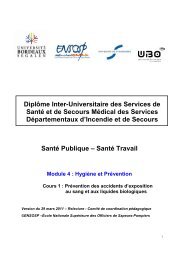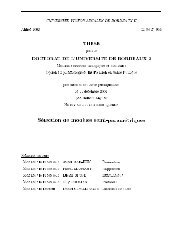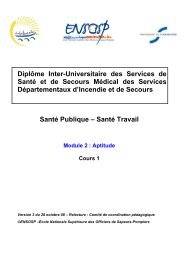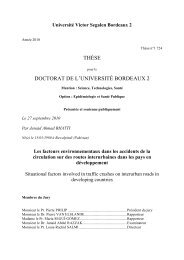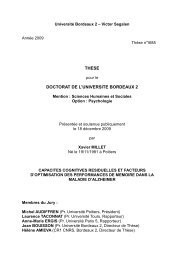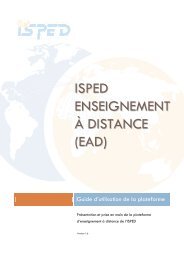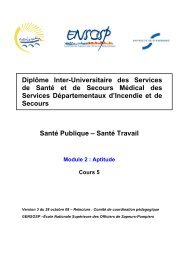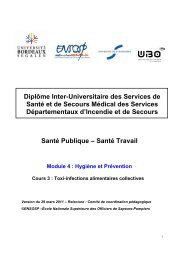- Page 1: Université Victor Segalen - Bordea
- Page 5: ien que la plupart des femmes inter
- Page 9: B Le suivi des activités et le mon
- Page 13 and 14: Graphique 7. Couverture de la proph
- Page 19 and 20: Mobilisation communautaireLa mobili
- Page 21 and 22: L’amélioration de la santé de l
- Page 23 and 24: logistiques disponibles, et par-là
- Page 25 and 26: objectifs et des activités éminem
- Page 27 and 28: surtout en coordonnant la définiti
- Page 29: postnatale, dans un contexte de pau
- Page 32 and 33: CHAPITRE 1. REVUE CRITIQUEDE LA LIT
- Page 35 and 36: 1.1. SANTE, ALLAITEMENT MATERNEL ET
- Page 37 and 38: Carte 2. Proportion de la mortalit
- Page 39 and 40: De plus, le suivi de la croissance
- Page 41 and 42: isque d’infections des voies resp
- Page 43 and 44: A.3.1. Les mécanismes de la transm
- Page 45 and 46: La période de l’allaitement mate
- Page 47 and 48: (estimé avant six semaines) (Villa
- Page 49 and 50: Depuis le début des années 1990,
- Page 51 and 52: Toujours à la fin des années 1990
- Page 53 and 54: l’efficacité d’un régime ARV
- Page 55 and 56: conséquences biochimiques, psychol
- Page 57 and 58:
énéficié d’un allaitement arti
- Page 59 and 60:
de risques d’exposition aux sécr
- Page 61 and 62:
(empowerment) et la définition d
- Page 63 and 64:
Au cours des années 1990, cette in
- Page 65 and 66:
Encadré 4. Extraits de la stratég
- Page 67 and 68:
Tableau 3. Evolution des recommanda
- Page 69 and 70:
Ces documents de l’OMS ont égale
- Page 71 and 72:
nombre de pays possible, réduit d
- Page 73 and 74:
pratiques des femmes concernant les
- Page 75 and 76:
de manière ponctuelle. Comme nous
- Page 77 and 78:
ont été introduits plus tardiveme
- Page 79 and 80:
comprendre ces normes sociales et c
- Page 81 and 82:
A.2. Le conseil et le dépistage pr
- Page 83 and 84:
permet de faciliter l’acceptabili
- Page 85 and 86:
taux de partage sont liés à la pe
- Page 87 and 88:
Encadré 7 - Etat des lieux : proph
- Page 89 and 90:
Le suivi continu des mères et enfa
- Page 91 and 92:
Tableau 5. Sélection d’expérien
- Page 93 and 94:
et la prophylaxie ARV universels, l
- Page 95 and 96:
zone rurale, par le biais de diffé
- Page 97 and 98:
appropriées et applicables des fem
- Page 99 and 100:
plus difficiles à adopter, notamme
- Page 101 and 102:
Tableau 6. Pratiques de nutrition i
- Page 103 and 104:
La prévention du risque de TME du
- Page 105 and 106:
districts ruraux, que la mise en œ
- Page 107 and 108:
espectivement. En 1999, 19,7 et 44,
- Page 109 and 110:
éducation 17 . Mais elles n’ont
- Page 111 and 112:
Ainsi, si certaines lois ont permis
- Page 113 and 114:
de réunion des syndicats, l’arre
- Page 115 and 116:
conservent une certaine forme d’i
- Page 117 and 118:
dépenses de fonctionnement de l’
- Page 119 and 120:
Le système sanitaire public du Zim
- Page 121 and 122:
personnes 28 . En 1997, la couvertu
- Page 123 and 124:
Zimbabwe Ministry of Health and Chi
- Page 125 and 126:
L’âge gestationnel médian à la
- Page 127 and 128:
de croissance, état reflétant le
- Page 129 and 130:
Graphique 4. Evolution de la préva
- Page 131 and 132:
fidèle » (Meursing and Sibindi, 2
- Page 133 and 134:
Par ailleurs, l’engagement financ
- Page 135 and 136:
Le principe de l’aide extérieure
- Page 137 and 138:
des structures de formation et le r
- Page 139 and 140:
Les décisions de sevrage sont avan
- Page 141 and 142:
national. Entre 1992 et 1998, plus
- Page 143 and 144:
B.2. La mise en œuvre de services
- Page 145 and 146:
Figure 5. Exemples de brochures éd
- Page 147 and 148:
Synthèse de la revue de la littér
- Page 149 and 150:
2.1. LE DISTRICT DE BUHERA ET MURAM
- Page 151 and 152:
Dans la majorité du district de Bu
- Page 153 and 154:
50%, respectivement (Central Statis
- Page 155 and 156:
Carte 4. Centres de santé offrant
- Page 157 and 158:
Figure 6. Cascade de services de PT
- Page 159 and 160:
Encadré 12. Résumé des services
- Page 161 and 162:
A.3.Les initiatives de promotion, d
- Page 163 and 164:
soutien, le seul actif pendant cett
- Page 165 and 166:
type « avant/après » sur les Con
- Page 167 and 168:
Critères de sélection pour l’an
- Page 169 and 170:
2.2.3. Enquête sur les pratiques d
- Page 171 and 172:
2.2.4. Enquête sur les services d
- Page 173 and 174:
Figure 9. Calendrier d’activités
- Page 175 and 176:
CHAPITRE 3. ENQUETES DETERRAIN175
- Page 177 and 178:
3.1.1. Cascade des services de PTME
- Page 179 and 180:
prescription de névirapine met en
- Page 181 and 182:
Lors de la première année d’act
- Page 183 and 184:
D’août 2001 à septembre 2002, u
- Page 185 and 186:
Tableau 18. Profil sociodémographi
- Page 187 and 188:
Le taux de retour au conseil post-t
- Page 189 and 190:
d’avoir bénéficié d’une édu
- Page 191 and 192:
B L’intervention anti-rétroviral
- Page 193 and 194:
Tableau 27. Circonstances de la pri
- Page 195 and 196:
données datées de décès materne
- Page 197 and 198:
Tableau 31. Caractéristiques socio
- Page 199 and 200:
Tableau 33. Caractéristiques socio
- Page 201 and 202:
pratiquer un allaitement mixte, les
- Page 203 and 204:
choisi l’allaitement maternel exc
- Page 205 and 206:
Graphique 10. Intention pré-partum
- Page 207 and 208:
3.2. CONNAISSANCES ET PRATIQUES EN
- Page 209 and 210:
l’allaitement maternel. Plus de 8
- Page 211 and 212:
3.2.3. Connaissance des facteurs de
- Page 213 and 214:
Tableau 47. Connaissance des facteu
- Page 215 and 216:
Tableau 47 (suite 1). Analyse univa
- Page 217 and 218:
Tableau 48. Attitudes en matière d
- Page 219 and 220:
Tableau 49. Comportements et recomm
- Page 221 and 222:
Tableau 50. Niveau de connaissance
- Page 223 and 224:
3.3. ENQUETE SUR LES PRATIQUES DE N
- Page 225 and 226:
La date de décès des mères qui n
- Page 227 and 228:
Tableau 55. Age des enfants au mome
- Page 229 and 230:
Groupes de discussionLa majorité d
- Page 231 and 232:
Parmi les enfants ayant été allai
- Page 233 and 234:
La plupart des femmes ont déclaré
- Page 235 and 236:
principalement motivée par l’imp
- Page 237 and 238:
Tableau 65. Participation de la fam
- Page 239 and 240:
Tableau 68. Aide alimentaire, distr
- Page 241 and 242:
principales du non-suivi de PTME ap
- Page 243 and 244:
D. L’éducation, le conseil et le
- Page 245 and 246:
socioculturelles a été mentionné
- Page 247 and 248:
3.4.1 Description des services d’
- Page 249 and 250:
également été cités. Les agents
- Page 251 and 252:
C. La participation du partenaire e
- Page 253 and 254:
(n=20). Les conseillers VIH, les m
- Page 255 and 256:
éponse à la progression des conna
- Page 257 and 258:
santé buccale de l’enfant. Le su
- Page 259 and 260:
informateurs-clés qui n’avaient
- Page 261 and 262:
Synthèse de l’ensemble des résu
- Page 263 and 264:
CHAPITRE 4. DISCUSSIONGENERALE263
- Page 265 and 266:
Les conditions opérationnelles de
- Page 267 and 268:
les primipares (kusungira) ; leur p
- Page 269 and 270:
l’expérience pilote de PTME à M
- Page 271 and 272:
mesurée à l’échelle nationale
- Page 273 and 274:
A.2 L’importance de la couverture
- Page 275 and 276:
(leadership du ministère de la san
- Page 277 and 278:
différents. Ainsi, progressivement
- Page 279 and 280:
comparée. Néanmoins, nous n’avo
- Page 281 and 282:
Plusieurs raisons peuvent expliquer
- Page 283 and 284:
Tout d’abord, les stratégies de
- Page 285 and 286:
Afin de favoriser la proximité et
- Page 287 and 288:
VIH et du dépistage prénatal du V
- Page 289 and 290:
permet une grande flexibilité stra
- Page 291 and 292:
4.2.2 Niveau de sensibilisation et
- Page 293 and 294:
Afin de mieux comprendre les facteu
- Page 295 and 296:
choix et prendre des décisions par
- Page 297 and 298:
et des interventions de PTME, et d
- Page 299 and 300:
prévention et une motivation à l
- Page 301 and 302:
organisé par PSI, principalement e
- Page 303 and 304:
comportements de santé, par l’é
- Page 305 and 306:
Ainsi, si la lutte contre le VIH/SI
- Page 307 and 308:
motivation et la confiance des femm
- Page 309 and 310:
MOH/CW à l’intervention et l’a
- Page 311 and 312:
appelées « umuntu ofileyo » (per
- Page 313 and 314:
l’accès aux services de santé (
- Page 315 and 316:
culturels de l’acquisition des co
- Page 317 and 318:
La PTME n’a été définie comme
- Page 319 and 320:
L’objectif de l’enquête MMCHS
- Page 321 and 322:
semble nécessaire de promouvoir de
- Page 323 and 324:
etard de croissance 87 . Ces observ
- Page 325 and 326:
dépistage VIH de la femme au parte
- Page 327 and 328:
4.3.2 Suivi en matière de nutritio
- Page 329 and 330:
Tanzanie, il a été suggéré que,
- Page 331 and 332:
du suivi en nutrition infantile. Le
- Page 333 and 334:
PTME. En effet, une meilleure accep
- Page 335 and 336:
des services de PTME à MMH a impli
- Page 337 and 338:
impliqués dans la définition d’
- Page 339 and 340:
suggérées, les contraintes liées
- Page 341 and 342:
contraintes dans leurs décisions q
- Page 343 and 344:
décision de nutrition infantile im
- Page 345 and 346:
Les interventions de PTME s’effor
- Page 347 and 348:
Au Zimbabwe, le programme national
- Page 349 and 350:
vite les interventions de mobilisat
- Page 351 and 352:
programmes nationaux comme en Thaï
- Page 353 and 354:
internationales telles que la Conve
- Page 355 and 356:
REFERENCES355
- Page 357 and 358:
Ayouba A, Nerrienet E, Menu E, Lobe
- Page 359 and 360:
Bulterys M, Fowler MG, VanRompay KK
- Page 361 and 362:
De Cock KM, Fowler MG, Mercier E, d
- Page 363 and 364:
Fawzi WW, Msamanga GI, Hunter D, Re
- Page 365 and 366:
Hawkins T. Le déclin économique a
- Page 367 and 368:
Koniz-Booher P, Burkhalter B, de Wa
- Page 369 and 370:
Mbori-Ngacha D, Nduati R, John G, R
- Page 371 and 372:
Nogueira SA, Lambert JS, Albuquerqu
- Page 373 and 374:
Forum, Institute of Development Stu
- Page 375 and 376:
Shaffer N, Chuachoowong R, Mock PA,
- Page 377 and 378:
Tharawan K, Manopaiboon C, Ellertso
- Page 379 and 380:
Van de Perre P. Mother-to-child tra
- Page 381 and 382:
World Health Organisation. Communit
- Page 383 and 384:
Switzerland, 28-29 June 2005; 2005a
- Page 385 and 386:
ANNEXES385
- Page 387 and 388:
Laboratory request formNOTESThis fo
- Page 389 and 390:
Date | _ || _ | . | _ || _ | . | _
- Page 391 and 392:
Date | _ || _ | . | _ || _ | . | _
- Page 393 and 394:
• Extra-pulmonary TB □ yes □
- Page 395 and 396:
Annexe 2. Questionnaire des enquêt
- Page 397 and 398:
Annexe 3. Questionnaire de l’enqu
- Page 399 and 400:
Section 2. Infant feeding practices
- Page 401 and 402:
2.3. So yesterday you’ve been fee
- Page 403 and 404:
3.14. If yes, which type of support
- Page 405 and 406:
5. Counselling5.1. Have you ever ha
- Page 407 and 408:
6.9. From whom?- doctor □ yes □
- Page 409 and 410:
Section 3 - Infant follow-up1. Freq
- Page 411 and 412:
2.4. Can you describe what safer br
- Page 413 and 414:
4.6. Why should the partner not be
- Page 415 and 416:
6.3 What type of infant feeding edu
- Page 417 and 418:
8.10. Please explain why yes/no?…
- Page 419 and 420:
10.3. Why don’t infant feeding ed
- Page 421 and 422:
Annexe 6. Manuscrit révisé Tropic
- Page 423 and 424:
Annexe 7. Manuscrit révisé Public



